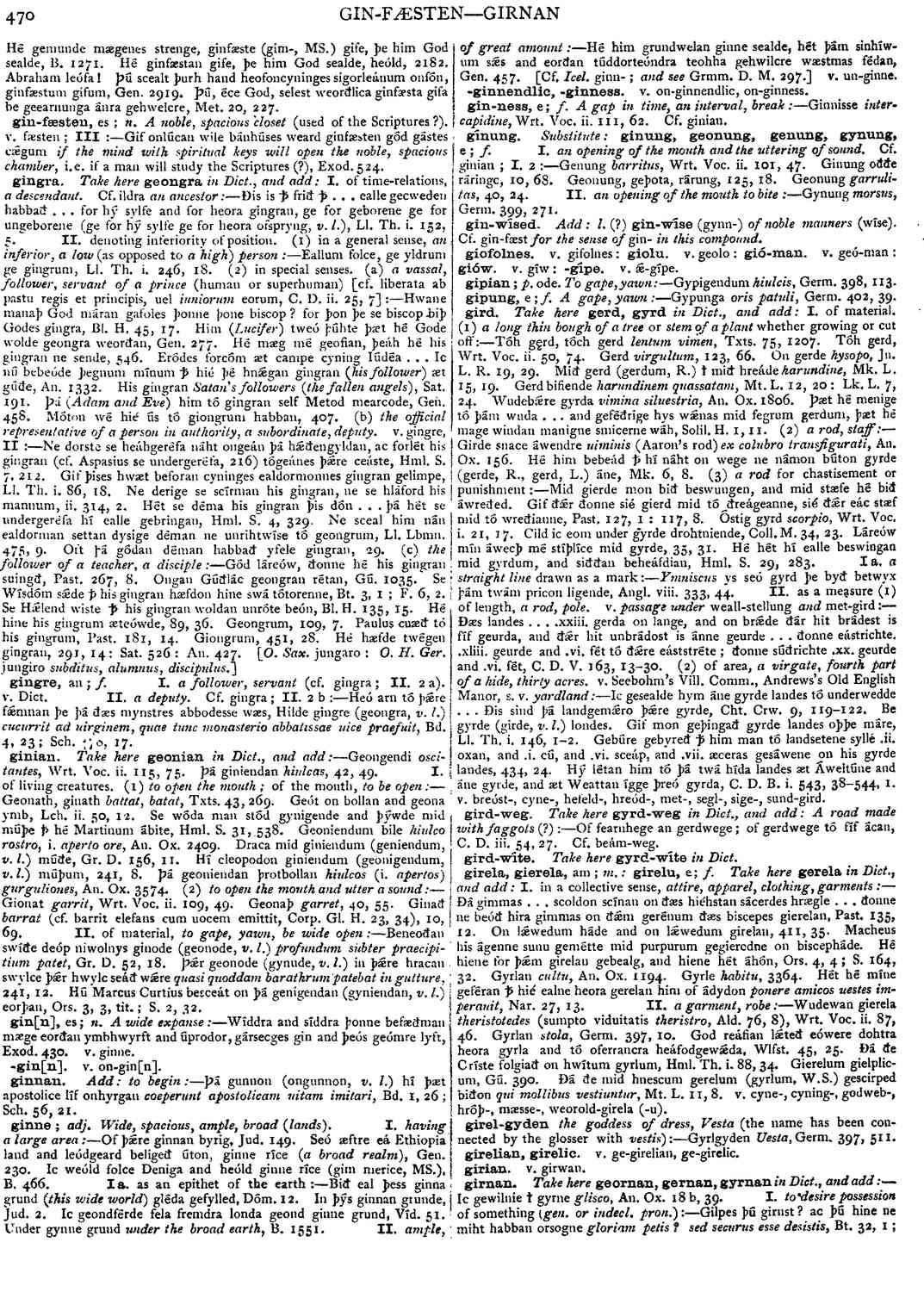girnan
- verb
-
Ic gewilnie ł gyrne
glisco,
- An. Ox. 18 b, 39.
-
Gilpes þú girnst? ac þú hine ne miht habban orsogne
gloriam petis? sed securus esse desistis,
- Bt. 32, 1;F. 114, 18.
-
Hé gierneð (girneð, v. l.) ðæs folgoðes
magisterium appetit,
- Past. 55, 21.
-
Hé mid wilnunga his gǽstes giernð ðæs écan gefeán
aeterna gaudia spiritus ex desiderio expectat,
- 395, 20.
-
Anweald þe gé swíþost girnaþ
vestra expetibilis potentia,
- Bt. 16, 1; F. 50, 32.
-
Ðá recceras ðe hira ágnes gilpes giernað
rectores qui semetipsos diligunt,
- Past. 143, 22.
-
Ðú wást ꝥ . . . ic ealles for swíþe ne girnde þisse eorþlican ríces; búton ic wilnode andweorces . . .
scis ipsa minimum nobis ambitionem mortalium rerum fuisse dominatam; sed materiam . . . optavimus,
- Bt. 17; F. 58, 25.
-
Þæs leánes þe heó lange gyrnde,
- Jud. 347.
-
Diórwyrþra hrægla hí ne girndan,
- Bt. 15; F. 48, 5.
-
Gyrnan þæs écean geférscipes,
- Bl. H. 197, 16.
-
Gif hí on écnesse nǽren, ðonne nǽre hiora swá swíðe tó girnanne, Bt. 34, 9; F. 146, 25. I a. where the object is not expressed :-- Ðæt hié cunnen hiora ǽgen gehealdan, and siððan ðæt hié óðerra monna ne giernen ut tenere sua sciant, et tunc ut aliena non ambiant, Past. 341, 9. I b. intrans. To have a desire for something,
long
for :-- Þá gierndon æfter þǽm onwalde,- Ors. 6, 28; S. 278, 10.
-
Gyrneð
gestit (saturare ),
- Wrt. Voc. ii. 96, 44.
-
Gernað
gestiunt (incumbere ),
- 76, 26.
-
Girnað,
- 40, 19.
-
Ic girnde
nitebar,
- 59, 79.
-
Gernde
satagit (praeferre ),
- 95, 11.
-
Gyrndon
satagistis, i. desideratis (dictare ),
- An. Ox. 5426.
-
Giornende
ambientes,
- Rtl. 87, 10.
-
Gif se man gyrneð (
desideret
) Crístes líchaman tó underfónne,- Ll. Th. ii. 176, 18.
-
Hí náht ne gyrndon tó hæbbene,
- Bl. H. 53, 25.
-
Hé giernð (girnð, v. l.) ðæt hé his welan iéce
augers opes ambit,
- Past. 331, 15.
-
Gé girnað ꝥ gé woldon eówerne naman tóbrǽdan geond eall eorþan,
- Bt. 18, 2; F. 64. 4.
-
Mið ðý ðá menigo giorndon on him
cum turbae inruerent in eum,
- Lk. L. 5, 1.
-
Ús gedafenað mid micelre eáðmódnysse gyrnan tó þám écan gefeán,
- Ll. Th. ii. 400, 2.
-
Swá micel swá þæs wífes wer girnð (
expetierit
),- Ex. 21, 22.
-
Se aƀƀ. þes biscophádes gernde, and se arceƀ. him forwernde,
- Chr. 1048; P. 172, 10.
-
Þá gyrnde hé griðes and gísla,
- P. 174, 27: 1093; P. 227, 32.
-
Hí georndon friðes,
- 1011; P. 141, 10.
-
Begann se cyngc gyman his sweostor him tó wífe, ac hé and his menn lange wiðcwǽdon, 1067; P. 201, 13. (1 a) giving person to whom the request is made :-- Nis þám sácerde þám men tó forwyrnanne scriftes þe him þæs tó gyrnð (
qui eam ab eo desiderat
),- Ll. Th. ii. 176, 7.
-
Gif hí tó him friðes tó ne girndon,
- Chr. 1009; P. 139, 11.
-
Þá eorlas gerndon tó him ꝥ hí móston beón wurðe . . .,
- Chr. 1052; P. 180, 6.
-
Girne hé tó Godes þeówum þæt hý him
absolutionem
macigan,- Wlfst. 180, 11.
-
Gyrn fram mé and ic selle [þé] þeóda postula a me et dabo tibi gentes, Ps. Rdr. 2, 8. IV a. to beg :-- Blind sum gesætt giorñde ł bæd (giornde, R.)
caecus quidam sedebat mendicans,
- Lk. L. 18, 35.
-
Ne mæg ic tó giornanne
non ualeo mendicare, 16, 3. IV b. to pray for evil, imprecate :-- Swá swá hé bæd, gyrnde ut imprecabatur i. optabat, An. Ox. 2820. IV c. the subject not personal :-- Gif þing gesceádlic swá gyrnþ (exigerit ),
- Angl. xiii. 374, 130.
Bosworth, Joseph. “girnan.” In An Anglo-Saxon Dictionary Online, edited by Thomas Northcote Toller, Christ Sean, and Ondřej Tichy. Prague: Faculty of Arts, Charles University, 2014. https://bosworthtoller.com/50829.
Checked: 0